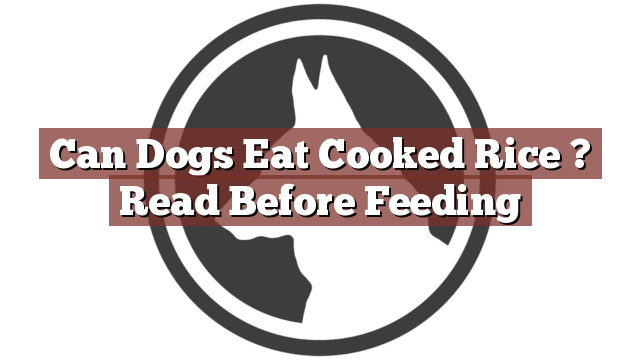Understanding Your Dog’s Dietary Needs
As a responsible pet owner, it is important to understand your dog’s dietary needs. Providing a balanced and nutritious diet is crucial for their overall health and well-being. While dogs primarily thrive on a diet that includes high-quality protein from meat, they can also benefit from certain other foods in moderation. However, it is essential to be aware of what foods are safe for them to consume. One common question that arises is, can dogs eat cooked rice?
Can Dogs Eat Cooked Rice? Read Before Feeding
The answer to the question, can dogs eat cooked rice?, is a resounding yes. Cooked rice is generally safe for dogs to consume and can even provide some health benefits. Rice is a good source of carbohydrates, which can provide energy for your furry friend. Additionally, cooked rice is easily digestible for dogs, making it a suitable option for those with sensitive stomachs or digestive issues. It can also be a useful addition to your dog’s diet if they have been suffering from an upset stomach or diarrhea.
However, it is important to note that rice should always be fed in moderation and as part of a balanced diet. While cooked rice is safe for dogs, it should not become the main component of their meals. It is always recommended to consult with your veterinarian before making any significant changes to your dog’s diet or introducing new foods. This is especially important if your dog has any underlying health conditions or dietary restrictions.
Pros and Cons of Feeding Cooked Rice to Dogs
Feeding cooked rice to your dog has its pros and cons. On the positive side, rice is a gluten-free and easily digestible carbohydrate source that can provide energy for your canine companion. It can also help alleviate digestive issues such as upset stomach or diarrhea. Rice is low in fat and cholesterol, making it a healthier alternative to certain other grains.
However, there are a few considerations to keep in mind. Rice lacks certain essential nutrients that dogs need for optimal health, such as vitamins and minerals. Therefore, it is crucial to ensure that your dog’s diet is well-rounded and includes a variety of other nutrient-rich foods. Additionally, overfeeding your dog with rice can lead to weight gain, which can have adverse effects on their overall health. Always remember that moderation is key when it comes to feeding cooked rice to your furry friend.
Conclusion: Considerations for Feeding Cooked Rice to Your Dog
In conclusion, dogs can eat cooked rice, and it can be a safe and beneficial addition to their diet when fed in moderation. Rice can provide energy and help with digestive issues, making it a suitable option for dogs with sensitive stomachs. However, it is important to remember that rice should not replace a balanced diet that includes other essential nutrients. Consult with your veterinarian before making any significant changes to your dog’s diet, as they can provide personalized advice based on your dog’s specific needs and health conditions. By understanding your dog’s dietary needs and making informed choices, you can ensure their overall well-being and happiness.
Thank you for taking the time to read through our exploration of [page_title]. As every dog lover knows, our furry friends have unique dietary needs and responses, often varying from one canine to another. This is why it's paramount to approach any changes in their diet with caution and knowledge.
Before introducing any new treats or making alterations to your dog's diet based on our insights, it's crucial to consult with a veterinarian about [page_title]. Their expertise ensures that the choices you make are well-suited to your particular pet's health and well-being.
Even seemingly harmless foods can sometimes lead to allergic reactions or digestive issues, which is why monitoring your dog after introducing any new food item is essential.
The content provided here on [page_title] is crafted with care, thorough research, and a genuine love for dogs. Nevertheless, it serves as a general guideline and should not be considered a substitute for professional veterinary advice.
Always prioritize the expert insights of your veterinarian, and remember that the health and happiness of your furry companion come first.
May your journey with your pet continue to be filled with joy, love, and safe culinary adventures. Happy reading, and even happier snacking for your canine friend!

